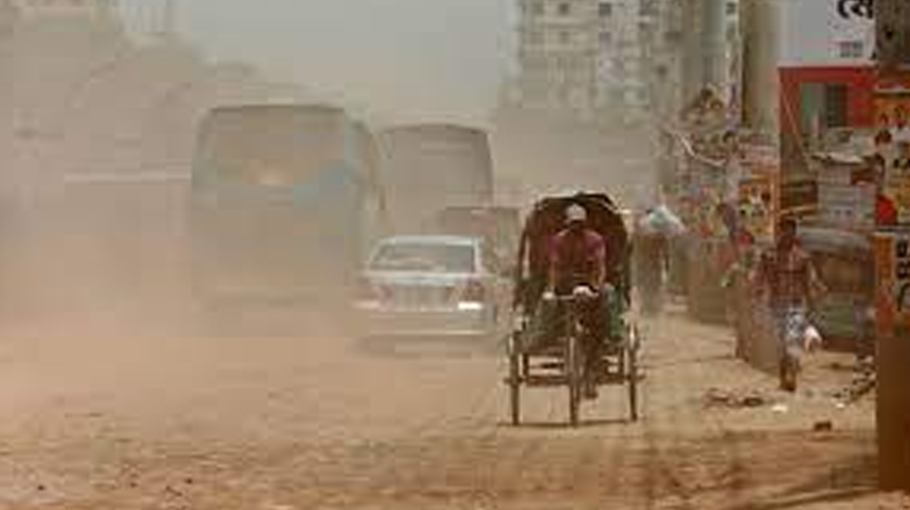Dust pollution in city rings helth alarm

With the advent of winter, the dust pollution in Dhaka city starts deteriorating sharply, posing a serious threat to public health.
However, the dust pollution reaches an alarming stage in the city before the onset of winter this year. Its level is much higher than at any time in the past.
At this moment as well as the beginning of November, the air in the city is now full with dust, while if there was dust in other years but so much dust would have not been witnessed at this time.
According to public health experts and environment activists, dust covers Dhaka city due to the massive discharge of pollutant particles from construction work, including the Metrorail project. The dust is also coming from brick kilns, smoke from vehicles, private construction like building houses and some other sources.
Read more: Factory blaze repeats in Old Dhaka
They blamed the uncontrolled road digging, unplanned development and construction work, lack of central management system, lack of coordination among government agencies and absence of strict law for the terrible dust pollution as well as the air pollution. “Flouting of construction guidelines in development projects is one of the main reasons for dust pollution in the city,” said Ziaur Rahman Litu of WBB Trust.
He said, “We, the city dwellers, are now living at high health risk as Dhaka city ranks the top among cities with worst air quality during the winter. So, the air pollution-related deaths and diseases are on the rise in Bangladesh.”
Friday (November 5) was a weekly holiday. On the other hand, there were no public vehicles on roads due to the ongoing transport strike. On such a day, the roads of Dhaka city were covered with dust.
Visiting Motijheel, Kakrail, Gulshan, Badda, Rampura, Tejgaon, Moghbazar, Malibagh, Farmgate, Mohakhali, Dhanmondi, Mohammadpur and some other areas in the city, it was witnessed that the city dwellers can’t move on the roads comfortably. Many points of the areas were seen engulfed in dust.
“Various development work including road digging are going on in almost all areas of the capital. The dust level has gone to an unbearable level. It is not possible to walk on the road without a facemask. If you walk a little or use public transport, a layer of dust falls on your clothes,” said Syed Saiful Alam Shovan, a rights activist and a resident of Mohammadpur area in the capital.
Recruitment test of some banks took place in Dhaka on Friday (November 5). Alongside, the vehicle crisis, the candidates who came to sit for the recruitment test suffered a lot also for the huge dust in the air of the capital.
Tasnima Ferdous, a candidate from Sylhet who participated in the recruitment test at Badda Alatunnesa Higher Secondary School centre, said, “We have been habituated to facemask following the Covid-19 situation. If I had gone out without a mask, the situation would have been much miserable because of the dust in the capital. I have been able to protect myself a bit from this bad condition by covering my nose and mouth with the facemask.”
Experts said that the air quality in Dhaka city was getting worse day by day. The situation has also been reflected in different national and international air pollution indices.
Syed Mahbubul Alam Tahin, a public health and environment policy expert, said that as winter approaches, Dhaka city faces heavy dust pollution every year, but there are still no visible signs to resolve the problem.
Talking to the Bangladesh Post on Friday, the secretary at the Center for Law and Policy Affairs (CLPA), said that the air in the city becomes heavily polluted with dust due to constant construction work without following any environment safety guidelines. “Construction work is done in other parts of the world. However, our construction management is not well. So, we are failing to control the dust pollution,” he said.
Like many other parts of the city, the air around the Bangladesh Secretariat, National Press Club and Bangladesh Bank is now heavy with dust although it is only the beginning of the dry season. The situation is even worse in many other areas in the city as the construction of the Metrorail project is going on.
Abu Naser Khan, Chairman of Save the Environment Movement, expressed anxiety over the prevailing dust situation. He told the Bangladesh Post that alongside the long-term plan, the authorities concerned must take an urgent initiative to save us from dusty Dhaka. The authorities of two city corporations of Dhaka can spray water on the roads daily to keep the road dust-free in the dry season.
He, however, said that spraying water is not a permanent solution. Initiatives must be taken to stop the sources of dust. Authorities need to work out a special action plan to control the terrible dust pollution as it turns worse in every winter, particularly from November to February, posing a serious health hazard to city dwellers, he added.
During the monsoon, the city dwellers suffer from waterlogging, while they suffer from dust pollution during the dry season. “But even before the start of the dry season this year, we have been suffering from severe dust pollution,” said a city dweller.




